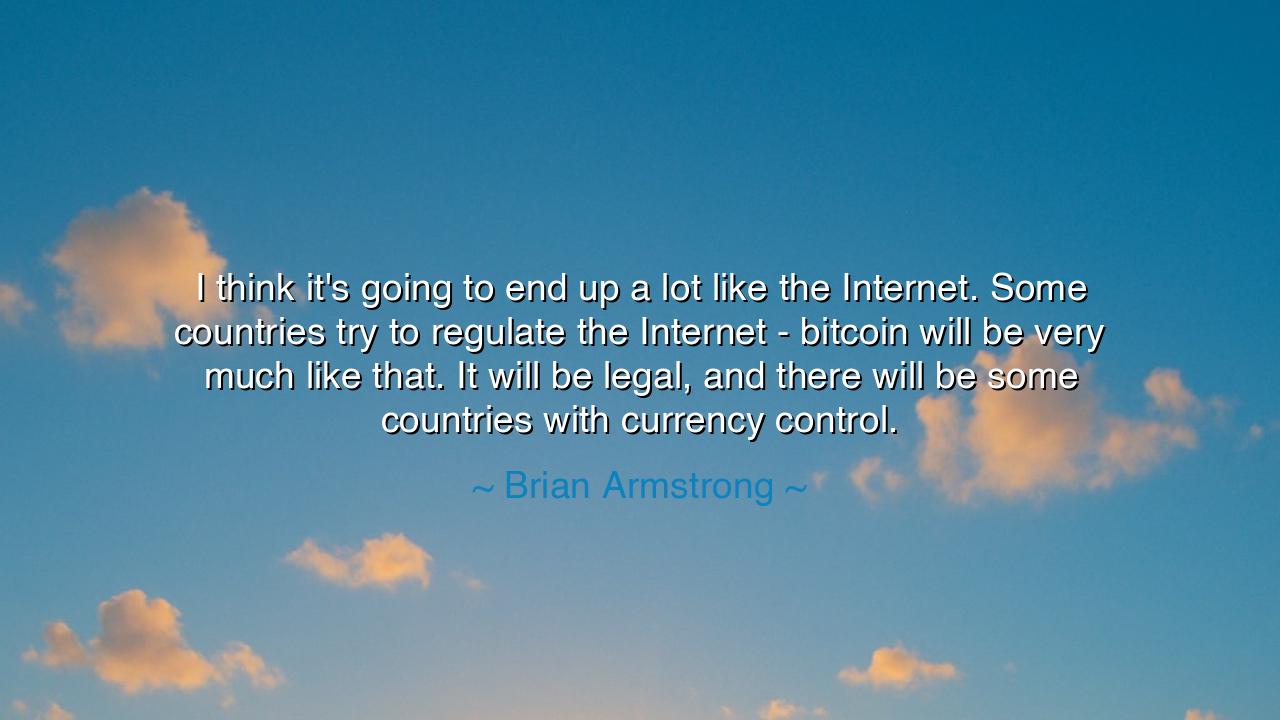
I think it's going to end up a lot like the Internet. Some
I think it's going to end up a lot like the Internet. Some countries try to regulate the Internet - bitcoin will be very much like that. It will be legal, and there will be some countries with currency control.






Hear the words of Brian Armstrong, a pioneer of the digital frontier, who declared: “I think it's going to end up a lot like the Internet. Some countries try to regulate the Internet—bitcoin will be very much like that. It will be legal, and there will be some countries with currency control.” In these words lies a vision of transformation, of a new order rising beyond the grasp of old empires, where power struggles between freedom and control will shape the fate of money itself.
The origin of this saying rests in Armstrong’s role as the founder of Coinbase, one of the first great marketplaces for cryptocurrency. He spoke as one standing at the edge of history, watching a technology emerge that, like the Internet before it, promised to change the way humans connect, trade, and trust one another. Just as the Internet broke down barriers of distance and centralized authority, so too did bitcoin challenge the ancient power of kings and states over coin and currency. His comparison was not made lightly, but with the weight of history in mind.
Consider how nations once sought to bind the Internet. China raised its Great Firewall; other lands censored voices, blocked pages, and slowed connections. Yet still, the Internet spread, for its strength lay in its decentralized nature, a network that could not easily be slain. So too, Armstrong foresaw, would it be with bitcoin. Governments may pass laws, banks may resist, and some lands may impose harsh currency control, but the idea of money without borders—money rooted in mathematics rather than decree—cannot easily be extinguished.
History itself tells us that whenever a tool of freedom emerges, rulers strive to restrain it. When Gutenberg’s press gave birth to printed books, kings and popes sought to censor them, fearing the free spread of knowledge. Yet the press could not be bound, and the Reformation and the Enlightenment followed in its wake. The parallel is clear: technologies of communication and of trust, once unleashed, escape the grasp of those who would hoard power. Armstrong’s words echo this lesson: bitcoin, like the press, like the Internet, will endure regulation, but its essence will endure.
Yet his vision carries not only triumph but caution. For while the Internet brought connection, it also brought surveillance; while bitcoin promises liberty, it also invites speculation, risk, and misuse. Armstrong reminds us that though many nations will embrace it, others will resist, wielding currency control to maintain their dominion. The future, therefore, will not be uniform; it will be a patchwork of freedom and restraint, legality and limitation, depending on the courage and wisdom of each society.
The lesson, O listener, is that when a new force arises in the world, one must learn to walk between hope and realism. Do not expect bitcoin to free all people at once, nor despair when rulers resist it. Instead, see it as a tide, moving steadily, reshaping shores over decades. Just as the Internet has woven itself into every corner of life, so too will decentralized money find its place, first contested, then normalized.
And what shall we do in our own lives? Learn, first of all, the nature of these tools. Do not fear what you do not understand. Seek wisdom about both their promise and their peril. Support laws that encourage innovation while guarding against injustice. And above all, remember that technology is a servant, not a master: it must serve human dignity, fairness, and freedom.
So remember the teaching of Brian Armstrong: bitcoin is like the Internet—a force that rulers may try to chain but cannot fully contain. It will be legal in many places, resisted in others, and shaped by the struggle between liberty and control. Let us prepare for this future with courage, with discernment, and with the determination to guide it toward justice, that wealth and trust may serve all, and not only the powerful.






AAdministratorAdministrator
Welcome, honored guests. Please leave a comment, we will respond soon